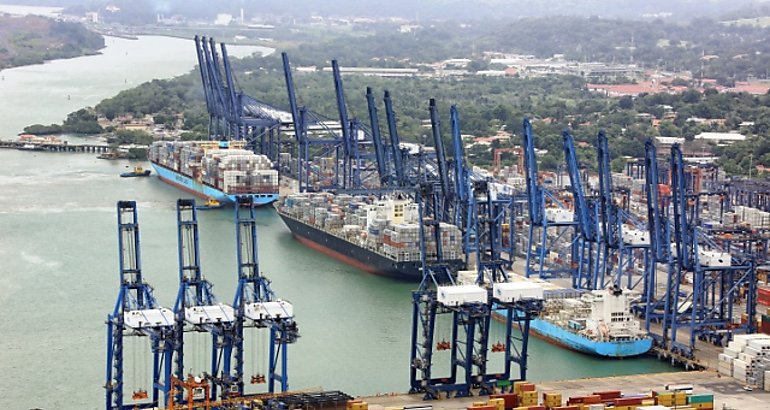The Panamanian government is considering rescinding the concession granted to Panama Ports Co., a subsidiary of Hong Kong’s Hutchison Port Holdings (HPH) for breach of the commitments agreed in the contract under law No. 5 of 16 January 1997. This is stated on the web site laverdaddepanamaports.com. The website, created to denounce alleged breaches of the powerful port operator, said that the government’s decision is based on Article 2.14.3, Termination of Contract by the State.
The clause stipulates that “The State may terminate this contract if the company fails to meet the substantial obligations which are contained in this contract.” In this case, says the clause, the State would take over control, operation and management of the ports of Balboa and Cristobal, subject to certain conditions.
When consulted, a senior official said, “the fact is that the government is very dissatisfied with the conduct of this company, which not only has managed to renege on commitments agreed in the original contract, but has become an obstacle for the government to take actions and run projects that are of interest to maritime and logistics development.”
These projects include the port of Corozal, whose execution is called for by the local and international maritime industry. However, PPC hopes that it will get the land in that area for expansion of the Port of Balboa, PPC filed an appeal with the Third Chamber of the Supreme Court in June, 2016, to declare null and void the decision of October 30, 2014, by the Board of Directors of the Panama Canal Authority (ACP) that authorized the administrator of the agency to tender the concession for the development and operation of the port of Corozal West.
The authorization was preceded by studies that justified the technical and economic viability of the terminal. Four major global port operators – PSA International Pte, Ltd, of Singapore.; Terminal Link, of France; APM Terminals, of the Netherlands and Terminal Investment Limited (TIL), of Switzerland – qualified to make proposals.
Full history of trouble
The truth is that the experience with PPC has been somewhat less than favorable for the country.
In July 1996, it was announced that the consortium of Kawasaki, Japan, and Cooper T. Smith, of the US, had won the concession by offering the payment of a fixed annuity of $10 million, plus 9% of gross income from container handling, and 7.5% of gross revenues for handling bulk cargo. In addition, the State would be granted 10% of the shares.
But action that cast doubt on the process, came immediately after the government announced that the winner was PPC, having offered to pay a fixed sum of $22.2 million as an annuity, plus 10% of gross income and provide 10% of the shares to the State. In return, it received the ports of Balboa and Cristobal, already in operation, and productive with assets of more than $1,000 million. Five years later it claimed the benefits of “port equalization granted to the ports of MIT and CCT on the Atlantic”, making the government of Mireya Moscoso exonerate payment of $22.2 million and 10% of annual gross revenues it had promised to pay.
In the process there were two factors challenged by local lawyers: 1) The equalization was granted by administrative law amending a contract, which is not legally feasible; and 2) PPC was not entitled to equalization for receiving productive assets in excess of $1,000 million, while CCT and MIT had to invest large sums to develop terminals that operate successfully today.
By this questionable “matching” PPC saved more than $500 million during the remainder of the concession granted for a 25 year term. The Presidents Martin Torrijos and Ricardo Martinelli promised, in their campaigns to nullify the equalization, but did not. The latter ended up decorating the CEO of HPH Group on August 21, 2013. In addition, PPC refused to pay dividends to the State in the first 18 years of the contract, claiming that it was reinvesting profits. Interestingly, other joint ventures do pay annual dividends to the State without sacrificing investments.
In 2006, Drewry Shipping Consultants, Ltd., Ocean Shipping Consultants (OSC), the Japanese International Cooperation Agency (JICA) and Moffat & Nichol Engineers, conceived a port on Farfán to take advantage of the explosive growth of trade on the Pacific coast of America. The government began negotiations with COSCO Pacific, of China, and Ports America, of the United States, to develop the project, but PPC blocked it with legal remedies before the Supreme Court. When this was held up and the global economic crisis emerged, the consortium lost interest in the project.
But there the bad experience of Panama with PPC did not end. Its newly installed CEO, Raymond Chan, sent a letter last week to the president of the Board of the ACP asking to be granted, by direct contract, 100 hectares where the port of Corozal will be developed. This new challenge puts the Panamanian government in the dilemma of delivering that resource to HPH or putting it at the service of the national interest of Panama.
Source: The Bulletin Panama
